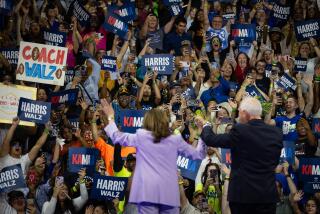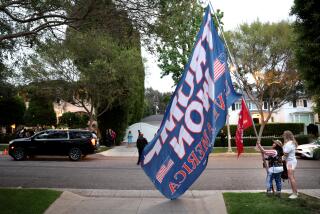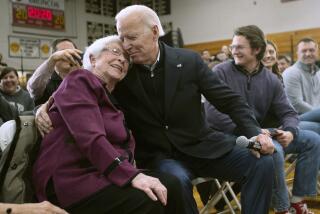2008: A super-size disconnect
Durham, N.H. — WHEN John Edwards held a town hall meeting at the University of New Hampshire here Monday night, the line started forming more than two hours before he was due to arrive. By the time the doors opened at 6:30, the line stretched down the hall, around a bend, past a student dining room, down a stairway and through another long hallway before finally expiring against the doorway of an exit from the building.
Standing near the back, Jim Allmendinger, a lawyer from Stratford, marveled at the throng around him. The last time Allmendinger saw Edwards was days before the 2004 New Hampshire primary, at a restaurant, where maybe 75 people turned out. “You could go up and talk to him,” Allmendinger recalled. Now he thought he would be lucky even to get in the same room with Edwards.
So it goes in the super-sized presidential campaign of 2008. Candidates are attracting the largest crowds ever seen this far from the first primaries, raising the most money and generating the most media attention. “When you talk to people at the campaigns, you get the sense [they] are on a freight train moving 300 miles per hour,” said Joe Trippi, the 2004 campaign manager for Howard Dean.
In one respect, this frenzy is a measure of civic health. One of the few redeeming virtues of our polarized politics is that it inspires activism. The huge early audiences for the 2008 candidates, and the record fundraising they announced this week, mark the continuation of a national reengagement with politics that saw turnout, contributions and volunteers all surge in 2004.
And yet the size, scope and speed of the 2008 race are transforming the process of picking the president in discouraging ways. Intimate events aren’t extinct; Democratic contender Barack Obama, who has drawn the largest crowds, heard impassioned and sometimes wrenching pleas for a single-payer healthcare system at a forum limited to 100 people in Portsmouth on Tuesday afternoon.
But even in Iowa and New Hampshire, the traditional citadels of person-to-person politics, such opportunities for close encounters with a candidate are diminishing. Just as important, the top candidates are losing the chance to spend quiet time listening to the problems and concerns of voters in rooms smaller than an auditorium.
The enormous expansion of media devoted to the race is widening this disconnect. Cable television networks, radio talk shows, on-line political tout sheets, blogs on the left and right -- to say nothing of the mainstream media -- have converged into a mammoth machine for inciting controversies, collecting gossip, pursuing scandal and measuring the candidates’ viability on a daily, if not hourly, basis. The media are stoking the race’s breathless tempo yet acquiescing as most candidates move slowly to unveil their policies (with Edwards a prominent exception).
This week, the political world pored over the presidential candidates’ first-quarter fundraising totals as if they were evidence in a murder trial that would decide who would live and who would die. Fundraising genuinely matters, but some of the commentary suggested that the insiders are determined to decide these candidates’ fate long before voters get a chance. “It feels like nobody wants to let this thing happen,” complained Tom Rath, a veteran New Hampshire Republican activist. “Everybody wants to be smarter than the other guy and know the answer before the game is played.”
Recoiling from this fevered dynamic, candidates and other players are seeking ways to reconnect voters to the process. Edwards has taken one encouraging step by forming One Corps, a group through which he asks supporters not only to organize for his campaign but to participate in community service. MoveOn.org, the giant online liberal advocacy group, will launch another promising effort next week by hosting candidates from both parties for online town meetings. Trippi suggests the candidates engage voters through an interactive policy process in which they post on their websites their current thinking about issues and ask people to respond with critiques and suggestions. (Obama, to his credit, announced something similar Tuesday.)
THESE ARE worthwhile ideas, but for voters and candidates alike, nothing replaces direct exposure. The good news is that, by all indications, many New Hampshire voters are not allowing the race’s frantic pace to stampede them. The rooms may be larger, but activists such as Joanne Celentano, a nutritional science professor at UNH, are still determined to personally examine the contenders before choosing. “I’m enjoying the time to just get to know the candidates,” she said as she waited for Edwards on Monday.
In a campaign already too dominated by money, polls, endorsements and a media rush to judgment, that determination to look before leaping practically counts as an act of civil disobedience.
More to Read
Sign up for Essential California
The most important California stories and recommendations in your inbox every morning.
You may occasionally receive promotional content from the Los Angeles Times.









